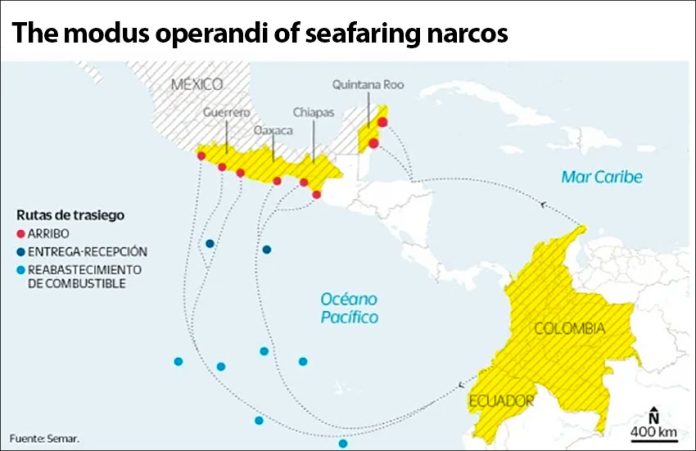Mexico’s largest criminal groups are outsourcing the retrieval of cocaine shipments to smaller groups posing as fishing cooperatives, providing another example of how maritime infrastructure is subverted by the drug trade.
Groups such as the Sinaloa Cartel and Jalisco New Generation Cartel (CJNG) are contracting local gangs in Mexico’s southern states of Chiapas, Oaxaca and Guerrero to fetch large shipments of cocaine out at sea, according to a report from Mexico’s Navy Ministry (Semar) accessed by the newspaper El Universal.
These local gangs set up fake fishing cooperatives, register vessels and use them to travel up to 350 nautical miles out to sea to receive drugs coming from Colombia and Ecuador. The cooperatives are usually created in marginalized coastal communities with local residents participating in the operations in search of a good payday, according to the SEMAR report.
The gangs receive the drugs, usually cocaine, in shark-fishing vessels rigged with outboard motors or in go-fast boats.
The ship’s crew is usually made up of both gang members and local fishermen, with a security presence maintained for more sensitive outings. A trip to go fetch a shipment of drugs can take between eight and 10 days depending on the type of vessel used.
Further support is provided by a detailed support system where other fishing vessels and lookouts on the shore provide information about where Mexican authorities are operating in order to avoid contact with naval ships.
InSight Crime analysis
Especially during times of economic hardship, it has become increasingly common for Latin American criminal groups to coerce vulnerable fishing communities into the drug trade.
This new scheme along Mexico’s southern coast is one of the more complex seen to date, requiring several parts. First, local gangs are subcontracted to retrieve drugs belonging to larger groups. Second, fake fishing cooperatives are created in rural fishing communities to create a veneer of legality. Third, local fishermen are encouraged to crew the vessels or track the movements of naval ships.
The Semar report detailed how the abundance of fishing communities along the Pacific coasts of Chiapas, Oaxaca and Guerrero provide plenty of options for the creation of these cooperatives. The registration of new vessels is also easy to hide among the thousands of new fishboats that were declared to Mexico’s fishing authority between 2017 and 2020.
The use of fishing communities is extensive outside Mexico as well. In Ecuador, fishermen have often been forced to act as drug mules, transporting shipments of cocaine to larger vessels offshore. More broadly, across the Americas, 13% of all drug seizures at sea in 2019 involved fishing vessels, according to a Colombian military report on maritime trafficking.
And whether volunteering or coerced to work as drug mules, fishing crews are often convenient targets. In 2017, 300 fishermen from Ecuador’s western provinces of Manabí and Esmeraldas were in jail across the Americas for transporting drugs at sea. Some of them have even been jailed in federal penitentiaries in the United States.
Reprinted from InSight Crime. Scott Mistler-Ferguson is a writer with InSight Crime, a foundation dedicated to the study of organized crime.
